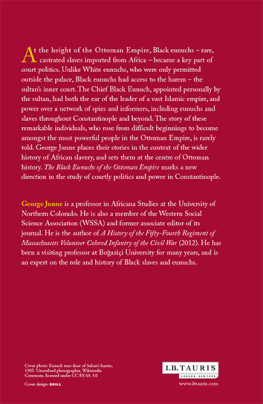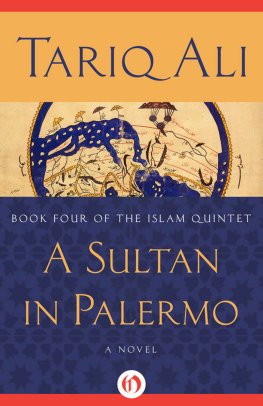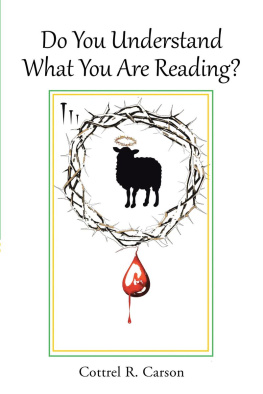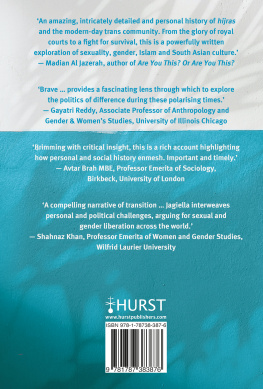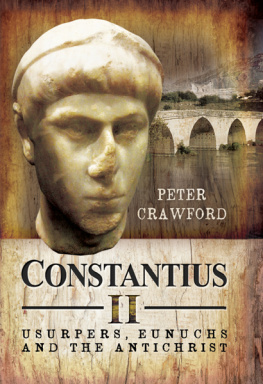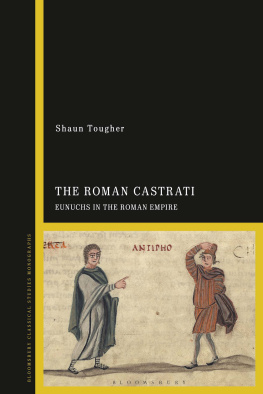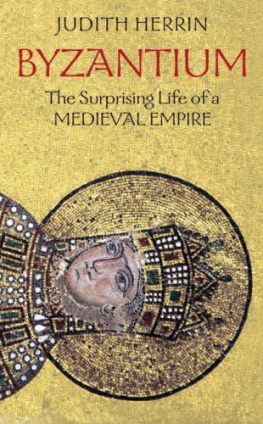
George Junne is a professor in Africana Studies at the University of Northern Colorado. He is also a member of the Western Social Science Association (WSSA) and former associate editor of its journal. He is the author of A History of the Fifty-Fourth Regiment of Massachusetts Volunteer Colored Infantry of the Civil War (2012). He has been a visiting professor at Boazii University for many years, and is an expert on the role and history of Black slaves and eunuchs.
THE BLACK
EUNUCHS OF
THE OTTOMAN
EMPIRE
Networks of Power in the Court of the Sultan
G EORGE J UNNE

Published in 2016 by
I.B.Tauris & Co. Ltd
London New York
www.ibtauris.com
Copyright 2016 George Junne
The right of George Junne to be identified as the author of this work has been asserted by the author in accordance with the Copyright, Designs and Patents Act 1988.
All rights reserved. Except for brief quotations in a review, this book, or any part thereof, may not be reproduced, stored in or introduced into a retrieval system, or transmitted, in any form or by any means, electronic, mechanical, photocopying, recording or otherwise, without the prior written permission of the publisher.
References to websites were correct at the time of writing.
Library of Ottoman Studies 55
ISBN: 978 1 78453 154 6
eISBN: 978 0 85772 893 7
ePDF: 978 0 85772 808 1
A full CIP record for this book is available from the British Library
A full CIP record is available from the Library of Congress
Library of Congress Catalog Card Number: available
To my friend John Freely, Professor Emeritus at Boazii University in Istanbul, who inspired me to research this topic.
CONTENTS
ACKNOWLEDGEMENTS
There were many people and organisations involved in conducting research on this interesting but elusive topic. Comparatively few scholars have chosen to focus their attention on the Black eunuchs of the Ottoman Empire, including the Chief Black Eunuchs. One recent person has been Dr Jane Hathaway of Ohio State University, whose biography Beshir Agha: Chief Eunuch of the Ottoman Imperial Harem is an example of excellent work that illuminates the power and the prestige that he and others were able to obtain while being emasculated African slaves. Her book inspired me to continue my own research.
I acknowledge Mr Serhan Afacan for translating The Inventory that Contains the Biographies of the Eunuch Servants Who are Employed in the Entire Imperial Harem (1903) and The Inventory That Consists of the Entry Dates and Biographies of the Eunuch Servants of the Imperial Harem (1893). Both texts are in Ottoman.
A special thanks also goes to Ms Sevl Akaygun, now a professor at Boazii University, for her ongoing assistance with translating documents while studying chemistry education at the University of Northern Colorado (UNC).
ARIT (American Research in Turkey) staff and library in Istanbul welcomed me to use their invaluable resources as well. I spent a few days there in their very comfortable space.
Professor Peter Kastner of UNC's Modern Languages Department translated German medical documents. A German doctor examined eunuchs and published a report on their physical conditions that I needed to access.
Professor Lorie Sable-Otto of UNC's Modern Languages Department assisted by translating French documents that also included medical material.
Dr John Freely, physics professor at Boazii University, has written several books on Turkey and encouraged me to work on this project. It was during a conversation with him in the summer of 2000 that I understood the importance of this subject. Freely related to me that in the 1970s, he actually saw one of the last palace eunuchs walking around Istanbul.
The Department of Western Languages and Literatures at Boazii University in Istanbul, including my good friend Professor Lamia Gulcur plus the 2007 graduate student assistants, were invaluable in a number of ways. Dr Gulcur assisted with helping me to gain access to Ottoman archives and the graduate students assisted by helping to locate resources and providing directions to locations.
Boazii University's library was also instrumental, as I spent many days researching the Ottoman Empire as it related to the Chief Black Eunuchs. It was fortunate that they also owned a set of calendar books that coordinated dates of the Christian calendar, the Muslim calendar and the Ottoman business calendar.
Ms Aye Kavak and staff of Ottoman Archives (Babakanlk Osmanl Arivleri) at Sultanahmet assisted by locating key resources for me. Access is usually only open to those who know Ottoman but they made an exception for me. Ms Kavak located key documents for me that were essential materials.
Mr Erhan Kaya (a.k.a. Yaya X), at that time a Turkish student working on an internship in Greeley, assisted me during this project's early phase. He translated articles and, after leaving Greeley, became a noted DJ in Istanbul under his alias.
Mr Patrick O'Neal, an American non-traditional summer student at Boazii University (2000), supported my interest in the topic of Black eunuchs. We were walking around areas of Istanbul such as Eyup and he pointed out a grave of a Chief Black Eunuch, which got me started on seriously considering the topic.
Ms Sreyya Suba and staff at the Yldz Palace Library (IRCICA: Research Centre for Islamic Research, History and Culture) in Istanbul were both helpful and welcoming at their wonderful facility.
The Centre for Islamic Studies (ISAM), located on the Asian side of Istanbul in Uskudar, also welcomed me and assisted in locating material and discussing my work.
Members of UNC's Department of History encouraged my efforts and Professor Erin Jordan used an early draft of this document in one of her classes.
At the University of Northern Colorado, I was fortunate that I befriended Turkish doctoral student Melih ztop, majoring in sport management, who translated some final documents that I received. Also, Assistant Professor Gulden Karakok of the Mathematics Department assisted in clarifying some questions.
The UNC 2002 Summer Research Grant awarded me some funds to begin my project, The Black Eunuchs of the Ottoman Empire: Networks of Power in the Court of the Sultan.
INTRODUCTION
The purpose of this work is to examine the histories of the Chief Black Eunuchs of the Ottoman Empire. Variously referred to as the Drrsade Aas, gh Dr al-Sa'da and Kzlar Aas, these African emasculated men were centres of power in the Ottoman Empire from 1574 almost until the Empire's end in the 1920s. The reader will become familiar with the lived-experiences of these men, including their histories, their accomplishments and their social and political failures and their successes. Because the accounts of eunuchs are not common knowledge to many, the work will also illuminate aspects of their histories in the Muslim world, in Europe and in Asia.
African American history is replete with references to the castration and emasculation of the Black male, both figuratively and literally. Researchers such as Daniel Patrick Moynihan and others, for instance, seemed to infer that the disintegration of Black families (even if that theory could be supported) was due to emasculating Black women. The emasculated Black man, whether true, partially true or false, is a subject that academic research in Africana Studies/Black Studies has had to confront.
Next page
